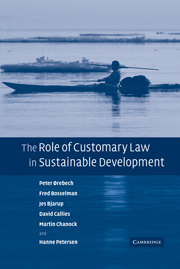Book contents
- Frontmatter
- Contents
- Preface
- Acknowledgements
- Table of cases
- List of international conventions
- Introduction
- 1 The linkage between sustainable development and customary law
- 2 Three case studies from Hawaii, Norway and Greenland
- 3 Social interaction: the foundation of customary law
- 4 How custom becomes law in England
- 5 How custom becomes law in Norway
- 6 Adaptive resource management through customary law
- 7 The place of customary law in democratic societies
- 8 Customary law, sustainable development and the failing state
- 9 Towards sustainability: the basis in international law
- 10 The case studies revisited
- 11 The choice of customary law
- 12 Conclusion: customary law in a globalizing culture
- References
- Index
- Authors index
10 - The case studies revisited
Published online by Cambridge University Press: 18 December 2009
- Frontmatter
- Contents
- Preface
- Acknowledgements
- Table of cases
- List of international conventions
- Introduction
- 1 The linkage between sustainable development and customary law
- 2 Three case studies from Hawaii, Norway and Greenland
- 3 Social interaction: the foundation of customary law
- 4 How custom becomes law in England
- 5 How custom becomes law in Norway
- 6 Adaptive resource management through customary law
- 7 The place of customary law in democratic societies
- 8 Customary law, sustainable development and the failing state
- 9 Towards sustainability: the basis in international law
- 10 The case studies revisited
- 11 The choice of customary law
- 12 Conclusion: customary law in a globalizing culture
- References
- Index
- Authors index
Summary
These issues suggest that we need to study carefully the technical and procedural details by which customary law systems operate to identify systems that are likely to promote sustainable development. With this objective in mind, we return to the examples of customary law in Hawaii, Northern Norway and Greenland. To what extent is the customary law in these areas exhibiting the characteristics needed to maintain sustainable resources management?
Hawaii: symbolism over substance
Native Hawaiians have acted to protect their customary rights to gather and hunt on privately owned property through the Hawaiian court system. Their efforts have achieved notable success in the form of the Hawaii Supreme Court's recognition of a state-wide right of native Hawaiians to hunt, fish and gather on all property other than property that has been developed for private residential use. These successes have undoubtedly strengthened the self-image of the largest indigenous group living in the United States. However, the victories of the native Hawaiians have proven to be more symbolic than substantive.
The ability of native Hawaiians to maintain their ethnic identity has been threatened by a decision of the United States Supreme Court in Rice v. Cayetano. The court invalidated a Hawaii statute that allowed only descendants of the races inhabiting the Hawaiian Islands before 1778 to vote for trustees of the Office of Hawaiian Affairs.
- Type
- Chapter
- Information
- The Role of Customary Law in Sustainable Development , pp. 411 - 434Publisher: Cambridge University PressPrint publication year: 2006



